In this article we discuss the information on Evaporative Condenser its Advantages and Disadvantages so let's start the further information
Evaporative Condenser
In Evaporative condenser the steam to be condensed enters at the top of series of pipes outside of which a film of cold water is falling. At the same time a current is circulates over the water film cause the evaporation of cooling water.
Evaporative condensers play a crucial role in industrial refrigeration, air conditioning, and power generation, offering an efficient and compact solution for heat exchange. By merging the principles of air-cooled and water-cooled condensers, evaporative condensers achieve high cooling efficiency through the process of evaporation. This essay explores the working mechanism, components, advantages, applications, and maintenance considerations of evaporative condensers.
The result of this, the steam circulating inside the pipe is condensed.
The remaining cooling water is collected at an increased temperature and reused.
It's original temperature is restored by addition of the requisite quantity of cold water. Evaporative condenser are provided when circulating water is to be used again and again.
The evaporative condensers are used in ammonia plants. Such this condensers require high amount of the refrigerant charge due to longer length of refrigerant. Still in case of ammonia systems this is quite cheap. In case of refrigerant it heated the water and then water reject the heat to air in form of evaporative water.
Air depart with high humidity as in cooling tower. Evaporative condenser is combine function of condenser and cooling tower.
Working Mechanism
The operational principle of an evaporative condenser involves a series of processes that efficiently transfer heat from the refrigerant to the surrounding air. The refrigerant vapor enters the condenser coils situated at the top of the unit. These coils are continuously sprayed with water, while fans draw air over them. The water absorbs heat from the refrigerant, causing it to evaporate. This evaporation process absorbs a significant amount of heat, cooling the remaining water. Consequently, the refrigerant within the coils releases its heat and condenses into a liquid. The now-warm water drips into a basin below, where it is recirculated by a pump. Fresh water is added to replace the evaporated portion, ensuring continuous operation.
Key Components
Several components are integral to the functioning of an evaporative condenser:
Condenser Coils: Made from materials with high thermal conductivity, such as copper or aluminum, these coils facilitate heat transfer from the refrigerant.
Water Distribution System: This system sprays water over the coils to enhance heat exchange.
Fans: These draw air through the unit, aiding the evaporation process.
Water Basin: Collects the water that drips from the coils.
Pump: Recirculates water from the basin back to the water distribution system.
Make-Up Water Supply: Adds fresh water to compensate for evaporation.
Drift Eliminators: Minimize water loss by preventing water droplets from being carried away with the airflow.
Advantages
Evaporative condensers offer several advantages over traditional cooling methods:
High Efficiency: The combined use of air and water cooling leads to greater efficiency.
Reduced Water Usage: They consume less water than conventional water-cooled systems, thanks to the evaporative process.
Compact Design: Typically smaller and lighter, making them suitable for various installations.
Lower Operating Costs: They generally consume less energy, leading to reduced operational expenses.
Applications of Evaporative Condenser
Evaporative condensers are widely used across various industries due to their efficiency and effectiveness:
Industrial Refrigeration: Essential in large-scale refrigeration systems found in food processing plants and cold storage warehouses.
HVAC Systems: Commonly used in commercial and industrial HVAC systems to provide efficient cooling.
Power Plants: Utilized in power generation facilities to condense steam from turbines, improving efficiency and reducing water usage.
Chemical Processing: Important in cooling and condensing gases in various chemical production processes.
Conclusion
Evaporative condensers are a vital component in modern cooling systems, providing efficient and sustainable solutions for various industrial and commercial applications.
By leveraging the evaporative cooling principle, these condensers achieve significant energy savings and reduced environmental impact compared to traditional cooling methods. Proper maintenance and water quality management are crucial to maintaining their performance and extending their operational lifespan. As industries continue to seek energy-efficient and environmentally friendly technologies, the role of evaporative condensers is likely to become even more significant.
Disadvantages of Evaporative Condenser
Water Quality Issues: Requires consistent water treatment to prevent scaling, corrosion, and biological growth, which can impede efficiency and damage the system.
High Maintenance: Regular cleaning and inspections are needed for coils, water basins, fans, and pumps, increasing labor and operational costs.
Water Consumption: Significant water use can be a drawback in areas with water scarcity or where conservation is critical.
Operational Costs: Costs for water treatment chemicals, maintenance labor, and replacement parts can add up over time.
Environmental Concerns: Proper disposal of blowdown water and the use of treatment chemicals pose environmental risks.
Installation Costs: Higher initial costs for equipment and infrastructure compared to some air-cooled systems.
Weather Dependence: Efficiency decreases in high humidity and cold weather conditions.
So in this lecture we discussed Evaporative Condenser, Advantages and Disadvantages hope you understand well.
Any query comment below. Thanks for reading. Keep in touch🙏.



.jpg)



